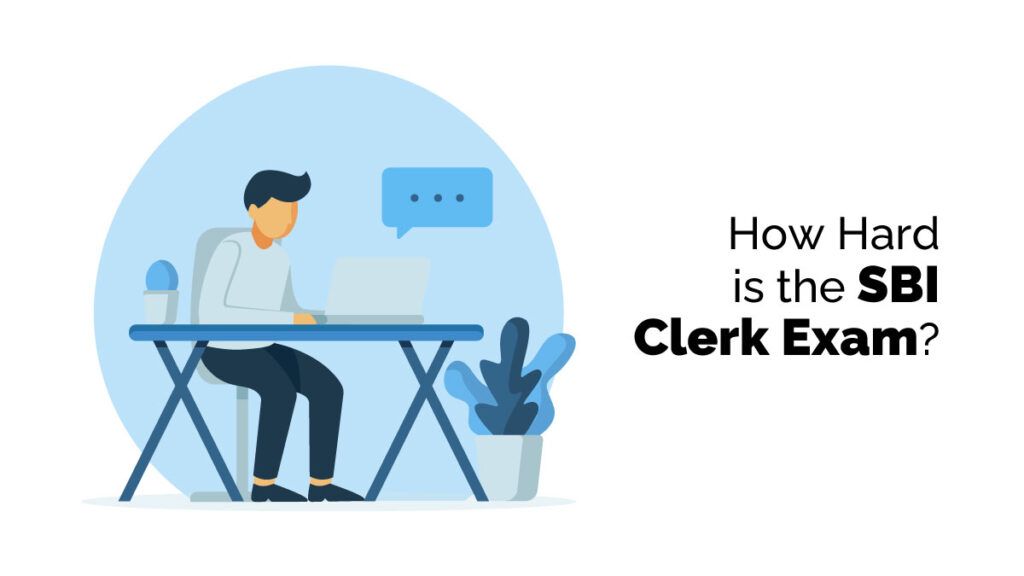Do you know that the Bank of India conducts the annual SBI Clerk Exam? This examination is designed to recruit candidates for Junior Associates (Customer Support and Sales) in various branches of the State Bank of India (SBI) nationwide. The SBI Clerk exam is highly coveted among bank job aspirants, attracting many candidates yearly. In the current year, SBI is set to announce a significant number of vacancies for the position of Junior Associates, and the recruitment process will include both Preliminary and Mains examinations conducted by the State Bank of India (SBI).
The role of SBI Clerk (Junior Associate) entails engaging with clients and handling associated operations. Those selected as SBI clerks are designated as cashiers and depositors and hold other positions that represent the face of a particular SBI Bank branch.
How Hard Is The SBI Clerk exam – Difficulty Level
Every exam can be challenging if one needs to be adequately prepared. Both the SBI Clerk and IBPS Clerk exams are categorised as clerical-level exams. Generally, the SBI prelims exam has an easy to moderate difficulty level, while the mains exam is intermediate to difficult. The exam consists of four sections: English, General Awareness, Quantitative Aptitude, and Reasoning. The question paper consists of 190 questions, with a maximum of 200 marks.
To crack the SBI Clerk Exam, candidates need to adopt an intelligent study approach. They should work hard and engage in rigorous practice. Developing a well-rounded strategy is essential for success in the exam. Identifying strong and weak areas and focusing on strengthening the vital areas while improving the weaker ones through consistent practice is crucial.
The Reasoning Ability section provides ample opportunities to maximise one’s marks. In the preliminary exam, this section’s difficulty level is relatively lower than the main exam. Candidates must focus on Simplification, Approximation, Missing and Wrong Number Series, Data Interpretation, and Arithmetic.
The English section consists of questions related to Reading Comprehension, Cloze Test, Fill-ups, Para jumbled, and more. Compared to the other areas, this section is generally considered more accessible.
The Quantitative Section of the SBI Clerk exam is known to be calculative and time-consuming, requiring candidates to maintain a steady pace. To excel in this section, candidates should first comprehend the exam pattern and marking scheme of the SBI Clerk. It is crucial to analyse the topics and identify areas that require more time for studying. While focusing on weak areas, candidates should focus on their vital spots. Practising previous years’ question papers is highly recommended.
Creating a well-structured study plan and adhering to it diligently is essential. Speed is a vital factor due to the time constraints in the exam. Therefore, candidates should enhance their preparation by practising more and more mock tests to improve their speed and accuracy.
Maintaining a balance between speed and accuracy is crucial in the SBI Clerk exam. Once candidates clearly understand the basics, they should practice solving questions within a specific time frame. Revising and grasping the related concepts is essential if they spend excessive time on a particular question. Aspirants should commence their SBI Clerk preparation as early as possible to maximise efficiency. This allows them ample time to cover the entire syllabus thoroughly, ensuring comprehensive knowledge well before the exam.
SBI Clerk Preparation Strategy
With the correct approach and sincere dedication, a two-month timeframe is sufficient for SBI Clerk preparation. Aspirants can make the most of this time by utilising it efficiently. If they still need to start their practice, it is advisable to begin now and capitalise on the available time. Let’s discuss how aspirants should initiate their SBI Clerk exam preparation.
Candidates must familiarise themselves with various parameters and relevant aspects of the SBI Clerk exam to excel in the upcoming stages. A comprehensive understanding of the exam will enable candidates to formulate an efficient strategy.
Moreover, there is no descriptive test in the SBI Clerk mains exams. And there is no sectional cutoff in the SBI Clerk Exam. Instead, candidates must secure a minimum percentage of marks on an aggregate level (Overall Cutoff). Each section of the exam has a particular time limit, and the order of the sections is predetermined by the SBI, preventing candidates from switching between them. Additionally, for every wrong answer marked, there is a negative marking of 1/4th mark.
By familiarising themselves with these important details, candidates can align their preparation accordingly and enhance their chances of success in the SBI Clerk exam.
Banking exam coaching plays a crucial role in shaping the career paths of individuals who aspire to join the banking industry. Enrolling in coaching institutes provides immense benefits in overcoming the challenges of cracking these highly competitive exams. At Finprov, we offer a highly effective banking course meticulously designed to prepare students for bank exams and significantly enhance their prospects of securing a job in the banking sector.
Our coaching program focuses on building a solid foundation of knowledge and skills essential to crack bank exams and excel in the industry. We provide personalised guidance and unwavering support to ensure that students remain motivated and steadfast in their pursuit of success.
Our coaching modules include quantitative aptitude, reasoning, English language, general awareness, and banking-related subjects such as banking laws, finance, and economics. To cater to the diverse needs of our students, we offer various coaching modes such as classroom coaching, online coaching, study materials, test series, mock tests, and doubt-clearing sessions.
We provide a comprehensive and tailored coaching program designed for individuals who aspire to build a rewarding career in the banking industry. Our regular and daily test series are invaluable tools for students to assess their knowledge, identify areas for improvement, and maintain a high level of motivation throughout their preparation journey.
Moreover, by concurrently preparing for multiple exams, students can optimise their efforts, save time, and increase their chances of success in various recruitment processes.
Enrolling in our coaching classes at Finprov will give you the necessary skills and knowledge to confidently tackle bank exams and pave the way for a prosperous and fulfilling career in the dynamic banking industry.










